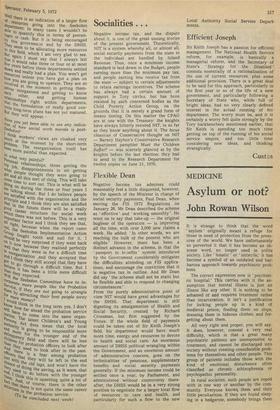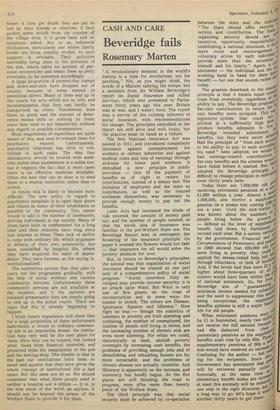MEDICINE
Asylum or not?
John Rowan Wilson
It is strange to think that the word ' asylum' originally meant a refuge for those in need of protection from the pressures of the world. We have unfortunately so perverted it that it has become an obscene word, no longer used in polite society. Like 'lunatic' or imbecile,' it has become a symbol of an outdated and barbarous approach towards psychiatric problems.
The correct expression now is psychiatric hospital.' This carries with it the assumption that mental illness is just an illness like any other. It is nothing to be ashamed of and requires treatment rather than incarceration. It isn't a justification for locking people up in a kind of medieval prison, feeding them on slops, dressing them in hideous clothes, and forgetting about them.
All very right and proper, you will say. It does, however, conceal a very real difficulty, which is that a great many psychiatric patients are unresponsive to treatment, and cannot be discharged into society without creating considerable problems for themselves and other people. This group of patients includes those with the kind of emotional disturbance often classified as chronic schizophrenia or psychopathic personality.
In rural societies, such people are coped with in one way or another by the community. Everyone knows them and their little peculiarities. If they are found sleeping in a hedgerow, somebody brings them home; if they get drunk they are put to bed by their friends or relatives; if they pocket some article from the counter of the village shop, it is given back and no questions asked. But in an industrial civilisation, particularly one where family bonds are being steadily eroded, no such support is available. Their activities inevitably bring them to the attention of the law, which takes no account of personal eccentricity and treats them as petty criminals, to be punished accordingly.
A large proportion of present-day tramps and down-and-outs have dropped out of society because of some mental or emotional defect. Many of them end up in the courts for acts which are so silly and inconsequential that they can hardly be categorised as crime. Punishment does them no good, and the concept of deterrence means little or nothing to them, since they tend to act impulsively without any regard to possible consequences.
Most magistrates of experience are quite aware of this, and tend to remand them for psychiatric reports. Unfortunately, psychiatric treatment has little to contribute in such cases. The idea that delinquency should he trEated with medicine rather than punishment is a noble one, but it neglects the fact that in most cases there is no effective medicine available. Often the best that can be done is to send them to a mental institution rather than to prison.
In future this is likely to become more difficult. The new policy in regard to psychiatric hospitals is to open their doors and return as many of their inhabitants as possible to the community. This seems bound to add to the number of inadequate, drifting individuals in our society. Many of them have been in confinement for a long time and their relatives have long since lost interest in them. Their lack of ability to cope with ordinary life, which originates in defects of their own personality, has been intensified by hospital life, where they have acquired the habit of dependence. They have become, as the saying is, institutionalised.
The authorities protest that they plan to carry out the programme gradually, with the help of social workers and various community services. Unfortunately these community services are not available at the moment, and if the patients are released prematurely they are simply going to end up in the police courts. There are signs that this is already beginning to happen.
I think future experience will show that for a large proportion of these unfortunate individuals, a return to ordinary commun ity life is an impossible dream. An institution may very well be the best place for them. Here they can be housed, fed, looked after, freed from financial anxieties, and protected from the temptations of the pub and the betting-shop. The trouble is that in the past our institutions have been so mean and squalid that they have given the whole concept of institutional life a bad name. But this need not be so. We should remember that what these people need is neither a hospital nor a prison — it is, in the true sense of the word, an asylum. It should not be beyond the power of the Welfare State to provide it for them.











































 Previous page
Previous page